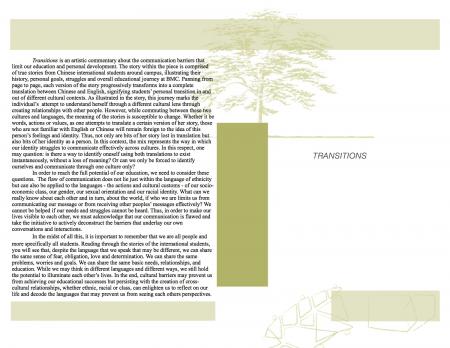Serendip is an independent site partnering with faculty at multiple colleges and universities around the world. Happy exploring!
Transitions
Submitted by ssaludades on Fri, 12/09/2011 - 4:57pm

Groups:
Remote Ready Biology Learning Activities

Remote Ready Biology Learning Activities has 50 remote-ready activities, which work for either your classroom or remote teaching.
About Student Papers
| This paper reflects the research and thoughts of a student at the time the paper was written for a course at Bryn Mawr College. Like other materials on Serendip, it is not intended to be "authoritative" but rather to help others further develop their own explorations. Web links were active as of the time the paper was posted but are not updated. |
Narrative is determined not by a desire to narrate but by a desire to exchange. (Roland Barthes, S/Z)
What's New? Subscribe to Serendip Studio
Recent Group Comments
-
Giuseppe Ferrara (guest)
-
Serendip Visitor (guest)
-
Serendip Visitor (guest)
-
Mesrianilaw (guest)
-
Serendip Visitor (guest)
-
jccohen
-
For Dummies (guest)
-
jccohen
-
jccohen
-
jccohen
Recent Group Posts
A Random Walk
Play Chance in Life and the World for a new perspective on randomness and order.
New Topics
-
9 weeks 6 days ago
-
10 weeks 9 hours ago
-
10 weeks 3 days ago
-
10 weeks 3 days ago
-
10 weeks 3 days ago


Comments
ssaludades, Your opening
ssaludades,
Your opening commentary on your commentary is itself very compelling. Your idea that "the meaning of the stories is susceptible to change" in translation not only via language but also via transitions in identity and in self-understandings is powerful, and suggests the real challenges to presuming communication as a way to bridge difference. The text itself reads as a kind of journey through transitioning languages and selves, and suggests to me a sense of fragility and also fluidity. Of course in the literal sense the Chinese characters offer a visual that for an English reader like myself is both visually inviting and beyond my reach; I can scroll up to read the English version but, as you say, this doesn't mean that I'm receiving the full, nuanced message. Your suggestion that we need to both "acknowledge that our communication is flawed" and "deconstruct the barriers" is tantalizing: How do we do this, and how/can education help us do this?